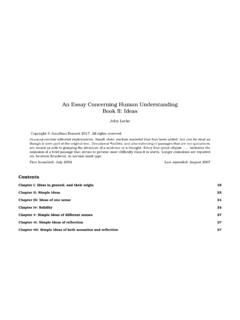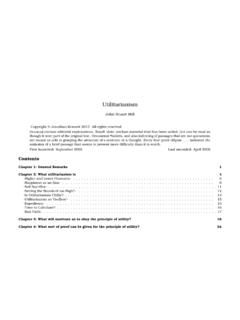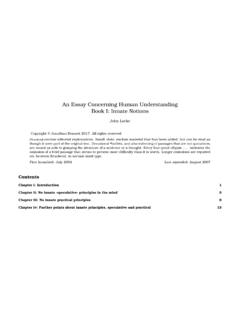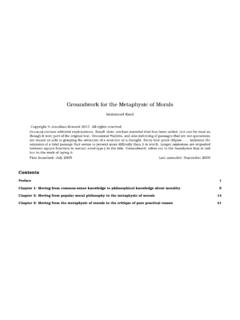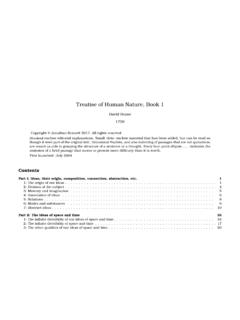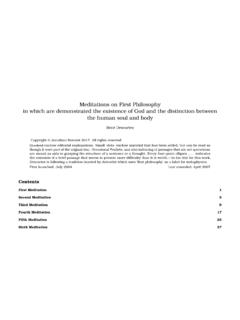Transcription of Enquiry Concerning Human Understanding
1 Enquiry Concerning Human UnderstandingDavid HumeCopyright Jonathan Bennett 2017. All rights reserved[Brackets]enclose editorial explanations. Small dots enclose material that has been added, but can be read asthough it were part of the original text. Occasional bullets, and also indenting of passages that are not quotations,are meant as aids to grasping the structure of a sentence or a thought. -The volume referred to at the outsetcontained the present work, theDissertation on the Passionsand theEnquiry Concerning the Principles of Morals,which were all published together.]First launched: July 2004 Last amended: January 2008 ContentsSection 1: The different kinds of philosophy1 Section 2: The origin of ideas7 Section 3: The association of ideas10 Section 4: Sceptical doubts about the operations of the understanding11 Part 2 ..15 Section 5: Sceptical solution of these doubts19 Part 2.
2 22 Section 6: Probability28 First EnquiryDavid HumeSection 7: The idea of necessary connection29 Part 2 ..36 Section 8: Liberty and necessity40 Part 2 ..48 Section 9: The reason of animals53 Section 10: Miracles55 Part 2 ..59 Section 11: A particular providence and a future state69 Section 12: The sceptical philosophy77 Part 2 .. 81 Part 3 ..83 First EnquiryDavid Hume1: Different kinds of philosophyMost of the principles and reasonings contained in this volume were published in a work in three volumes calledA Treatiseof Human Nature a work which the author had planned before he left college, and which he wrote and published not long failure made him aware of his error in publishing too early, and he reworked the whole thing in the following pieces, inwhich he hopes he has corrected some careless slips in his reasoning, and more in his expression of his views, in several writers who have honoured the author s philosophy with answers have taken care to aim their guns only at thatyouthful work, which the author never acknowledged, having published it anonymously , and they have boasted of the victoriesthey thought they had won against it.
3 This behaviour is flatly contrary to all the rules of honesty and fairness, and a strikingexample of the debating tricks that bigoted zealots think it is all right for them to employ. From now on, the author wants thefollowing pieces to be regarded as the sole source for his philosophical opinions and 1: The different kinds of philosophyMoral philosophy, or the science of Human nature, canbe treated in two different ways, each of which has itsown special merit and may contribute to the entertainment,instruction, and reformation of mankind[ moral philosophy herecovers every study involving Human nature, including history, politics,etc.]. One of the two treatments considers man chiefly asborn for action, and as guided in his conduct by taste andsentiment[= feeling or opinion ], pursuing one object and avoid-ing another according to the value they seem to have andaccording to the light in which they are presented.
4 As virtueis agreed to be the most valuable thing one could pursue,philosophers of this kind paint virtue in the most charmingcolours, getting help from poetry and eloquence and treatingtheir subject in a popular and undemanding manner that isbest fitted to please the reader s imagination and arouse hisaffections. They select the most striking observations andexamples from common life; they set up proper contrastsbetween opposite characteristics such as virtue and vice,generosity and meanness ; and, attracting us into the pathsof virtue by visions of glory and happiness, they direct oursteps in these paths by the soundest rules and the mostvivid examples. They make usfeelthe difference betweenvice and virtue; they arouse and regulate our beliefs andfeelings; and they think they have fully reached their goal ifthey manage to bend our hearts to the love of honesty andtrue who do moral philosophy in the secondway focus on man as areasonablerather than as anactivebeing, and try to shape his thinking more than to improvehis behaviour.
5 They regard Human nature as a subject oftheoretical Enquiry , and they examine it intently, trying tofind the principles that regulate our Understanding , stirup our sentiments, and make us approve or blame thisor that particular object, event, or action. They think itsomewhat disgraceful that philosophy hasn t yet establishedan agreed account of the foundation of morals, reasoning,and artistic criticism; and that it goes on talking abouttruth and falsehood, vice and virtue, beauty and ugliness,1 First EnquiryDavid Hume1: Different kinds of philosophywithout being able to fix the source of these they attempt this hard task, no difficulties deter them;moving from particular instances to general principles, theythen push their enquiries still further, to get to principlesthat are even more general , and they don t stop, satisfied,until they arrive at the basic principles that set the limitsto Human curiosity in every branch of knowledge.
6 Thoughtheir speculations seem abstract, and even unintelligible toordinary readers, they aim at getting the approval of thelearned and the wise; and think themselves well enoughcompensated for their lifetime s work if they can bring outinto the open some hidden truths that may be good for latergenerations to know.[In the writings of Hume and others of histime, a principle could be something propositional such as the principlethat every event has a cause, but it could also be a non-propositionalforce,cause, orsource of energy. Make your own decision about whetherin this paragraph (and some others) principle has one meaning or theother or both.]The general run of people will certainly always prefer therelaxed and obvious kind of philosophy to the accurate andabstruse kind; and many will recommend the former asbeing not only the more agreeable of the two kinds but alsothe more useful.
7 [To us accurate means something like correct asa result of care . In Hume s day it often meant merely done with carefulattention to detail , with no implication of being correct. This version willlet accurate stand; but many of Hume s uses of it would strike you asodd if you didn t know whathemeant by it.]It enters more intocommon life; moulds the heart and affections; and becauseit involves principles on which peopleact, it reforms theirconduct and brings them nearer to the model of perfectionthat it describes. The abstruse philosophy, on the otherhand, is based on a mental attitude that cannot enter into every-day business and action; so it vanishes when thephilosopher comes out of the shadows into daylight, and itsprinciples can t easily influence our behaviour. The feelingsof our heart, the agitation of our passions, the intensity ofour affections, scatter all its conclusions and reduce theprofound philosopher to a mere easy philosophy let us face the fact has achievedmore lasting fame than the other, and rightly so.
8 Abstractreasoners have sometimes enjoyed a momentary reputation,because they caught the fancy of their contemporaries orbecause the latter were ignorant of what they were doing; butthey haven t been able to maintain their high standing withlater generations that weren t biased in their favour. It iseasy for a profound abstract philosopher to make a mistakein his intricate reasonings; and one mistake is bound tolead to another, while the philosopher drives his argumentforward and isn t deterred from accepting any conclusion byits sounding strange or clashing with popular opinion. Not sowith a philosopher who aims only to represent the commonsense of mankind in more beautiful and more attractivecolours: if by accidenthefalls into error, he goes no than pushing on, he renews his appeal to commonsense and to the natural sentiments of the mind, gets backonto the right path, and protects himself from any dangerousillusions.
9 The fame of Cicero flourishes at present; but thatof Aristotle is utterly decayed. La Bruy re is read in manylands and still maintains his reputation: but the glory ofMalebranche is confined to his own nation, and to his owntime. And Addison, perhaps, will be read with pleasure whenLocke has been entirely be amere philosopheris usually not thought well of inthe world, because such a person is thought to contributenothing either to the advantage or to the pleasure of society, to live remote from communication with mankind, and tobe wrapped up in principles and notions that they can tpossibly understand. On the other hand, themere ignoramus2 First EnquiryDavid Hume1: Different kinds of philosophyis still more despised; and at a time and place where learningflourishes, nothing is regarded as a surer sign of an ill-bredcast of mind than having no taste at all for learning.
10 The bestkind of character is supposed to lie between those extremes:retaining an equal ability and taste for books, company, andbusiness; preserving in conversation that discernment anddelicacy that arise from literary pursuits, and in businesspreserving the honesty and accuracy that are the naturalresult of a sound philosophy. In order to spread and developsuch an accomplished kind of character, nothing can be moreuseful than writings in the easy style and manner, which stayclose to life, require no deep thought or solitary pondering tobe understood, and send the reader back among mankindfull of noble sentiments and wise precepts, applicable toevery demand of Human life. By means of such writings,virtue becomes lovable, the pursuit of knowledge agreeable,company instructive, and solitude is a reasonable being, and as such he gets appro-priate food and nourishment from the pursuit of knowledge;but so narrow are the limits of Human Understanding thatwe can t hope for any great amount of knowledge or for muchsecurity in respect of what we do know.
